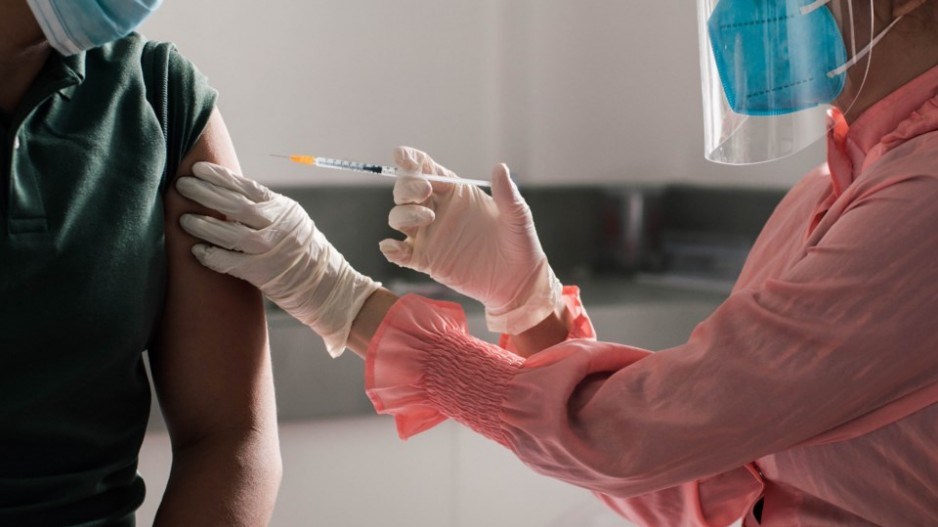With relaxed restrictions and a sneaky new variant, experts say it's not just Canada's most vulnerable populations who should be planning for a second booster.
Recently, the National Advisory Committee on Immunization (NACI) recommended fall booster doses for Canadians 12 years and older to help provide protection from COVID-19 as the colder months approach.
Horacio Bach, clinical assistant professor in the University of British Columbia's infectious diseases division, said immunity from the last round of boosters around Christmas is fading. The new BA.4 and BA.5 Omicron subvariants are thriving with loosened restrictions.
"The virus is mutating, and these mutations are helping the virus to evade the immune system," Bach said.
Why aren't the old vaccines working?
The virus and the vaccine's antibodies are like a lock and key, according to Bach.
The antibodies are the key, and the virus is the lock. When the key goes into the lock and opens it, Bach said the antibodies successfully bind and neutralize the virus.
"Now, as a result of the mutation, the key doesn't work properly," Bach said. "When you put it inside the lock, it doesn't open, or you have to force it a little to open."
The antibodies in the original vaccine are no longer as effective in protecting against infection, Bach said. This is the reason, he added, that the virus has mutated so many times, and talk of a seventh wave is spreading across Canada.
Even with a third or fourth dose of the original vaccine, Bach said immunity might only improve about 10 or 20 per cent, which will drop again after a few months.
"We are in the cycle where we continue to use the same vaccine over and over and over," he said. "Now, the ideal solution will be to start to vaccinate against Omicron because the previous variants don't exist anymore."
This targeted vaccination effort is already in progress across the border. Pfizer recently released promising data on its Omicron-specific booster that has also been submitted to the U.S. Food and Drug Administration (FDA) for review.
"That will be a vaccine against the virus that is escalating now, not the [variant] that disappeared already," Bach said.
False impression that COVID 'is over'
However, as this new vaccine is being developed and NACI is urging Canadians to get the fourth dose, Bach is still fixated on the number of people who don't yet have their third shot.
"The problem is there's an impression that COVID is over," he said. "[That] you will have flu-like symptoms, and that's it."
In B.C., 53 per cent of people are fully vaccinated with three doses, according to the COVID-19 Tracker Canada. That number drops to 49 per cent for all of Canada.
For this reason, Bach recommends everyone go out and get whatever dose is available. Then, when a variant-specific booster becomes available, he said everyone should take advantage of that as their fourth or fifth dose.
Bach said immunocompromised and elderly populations, specifically, need to focus on getting their fourth dose to provide short-term protection until a variant-specific vaccine is available for a fifth dose.
"All these risky groups [need a booster] to pump up the immune system," he said. "Then we need to wait for the new vaccine that will be against the Omicron."
B.C. residents tired of waiting for fourth doses
However, for some British Columbians looking to follow Bach's advice, the process to do so has been anything but easy.
Currently, in B.C., only seniors in long-term care or assisted living facilities, anyone over the age of 70 and Indigenous people over the age of 55, is eligible for their fourth dose six months after their first booster.
Vancouver resident Johanna Read falls into the next tier of British Columbians who will be eligible for their fourth dose when more spots open up.
However, Read is no longer waiting on the province to make her fourth dose available to her after travelling across the border on Wednesday to get vaccinated in Blaine, Wash.
Read started calling B.C.'s vaccine hotline and her MP's office about seven weeks ago because she was scheduled for surgery and wanted to protect herself from the virus while in the hospital.
She was hoping her circumstances would make her eligible for an exception.
"I'm very concerned about the long-term effects of COVID," Read said. "I want to minimize that as much as I can for myself."
What she experienced was a broken system, in which the information offered to her by the vaccine hotline depended on who picked up at the other end.
The only helpful response came much too late, she said.
"The day before my surgery, they said that if I had a doctor's note, then I could have the shot," Read said. "But then, of course, it was too late."
Read said she's been working very hard to avoid COVID-19 and its consequences throughout the pandemic. She said she doesn't understand why her efforts have been complicated by the provincial government's messaging about the virus.
"I don't understand why we've created all this bureaucracy," Read said. "We're told that we have to manage our own risk, but we're not being given any tools in order to do that."
Read hopes that B.C. follows the lead of other provinces, such as Quebec, where anyone over 18 can get their fourth dose so that other residents eager to get boosted don't have to travel out of the province as she did.




